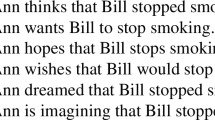Abstract
A simple model accounting for semantic properties of propositional attitude operators in negative contexts with no reference to possible worlds is proposed. Verbs occurring in such operators denote relations between individuals and specific sets of sentences (of a given natural language) and their negation is defined as the complement within a specific set of cognitively determined sentences. This approach avoids in particular the problem of intensionality of propositional attitude operators and allows to use many tools from the generalised quantifier theory. In that way the negation giving rise to factive presuppositions and to the neg-raising is defined in a natural way.
Similar content being viewed by others
References
Anand, P. & Hacquard, V. (2014). Factivity, belief and discourse. In I. Crnič & U. Sauerland (Eds.), The art and craft semantics: A festschrift for Irene Heim (Vol. 1, pp. 69–90). Cambridge, MA: MIT WPL.
Bartsch, R. (1973). “Negative transportation” gibt es nicht. Linguistische Berichte, 27, 1–7.
Ciardelli, I., Groenendijk, J., & Roelofsen, R. (2019). Inquisitive semantics. Oxford: Oxford University Press.
Collins, C. & Postal, P. (2018). Disentangling two distinct notions of NEG raising. Semantics and Pragmatics 11(5).
Egré, P. (2008). Question-embedding and factivity. Grazer Philosophische Studien, 77, 85–125.
Fillmore, C. (1965). Entailments rules in a semantic theory. POLA Report N10, 60–82. Reprinted in J. Rosenberg & C. Travis (Eds.), Readings in the Philosophy of Language, Prentice Hall 1972.
Higginbotham, J. (2006). Sententialism: The thesis that complement clauses refer to themselves. Philosophical Issues, 16, 101–119.
Horn, L. R. (1989). A natural history of negation. Chicago, IL: University of Chicago Press.
Karttunen, L. (1977). Syntax and semantics of questions. Linguistics and Philosophy, 1(1), 3–44.
Kiparsky, P., & Kiparsky, C. (1970). Fact. In M. Bierwisch & K. E. Heidolph (Eds.), Progress in linguistics (pp. 143–173). The Hague:Mouton.
Klein, E. (1975). Two sorts of factive predicates. Pragmatics Microfiche, 1, 1.
Mayr, C. (2019). Triviality and interrogative embedding: Context sensitivity, factivity and neg-raising. Natural Language Semantics, 27(3), 227–278.
Partee, B. H. (1982). Belief-sentences and the limits of semantics. In S. Peters & E. Saarinen (Eds.), Processes, beliefs, and questions (pp. 87–106). Dordrecht: Reidel.
Pelletier, F. J. (1994). The principle of semantic compositionality. Topoi, 13, 11–24.
Schlenker, P. (2005). The lazy Frenchman’s approach to the subjunctive. In T. Geerts, I. van Ginneken, & H. Jacobs (Eds.), Romance languages and linguistic theory. Selected papers from ‘Going Romance’, 2003 (pp. 269–309). Amsterdam: Benjamins.
Spector, B., & Egré, P. (2015). A uniform semantics for embedded interrogatives: An answer, not necessarily the answer. Synthese, 127, 1729–1784.
Tsohatzidis, S. L. (1993). Speaking of truth-telling: The view from Wh-complements. Journal of Pragmatics, 19, 271–279.
Tsohatzidis, S. L. (1997). More telling examples: A reply to Holton. Journal of Pragmatics, 28, 625–638.
Uegaki, W. (2019). The semantics of question-embedding predicates. Language and Linguistics Compass, 13, 1–17.
Westerståhl, D. (2012). Midpoints. In T. Graf, D. Paperno, A. Szabolcsi, & J. Tellings (Eds.), Theories of everything: In honor of Ed Keenan (pp. 427–439). Los Angeles, CA: UCLA Linguistics Department Publications.
Zuber, R. (1975/1977). Decomposition of factives. Language Studies, 1(3), 407–421.
Zuber, R. (1980). Note on why factives cannot assert what their complement sentences express. Semantikos vol. 4–2.
Zuber, R. (1982). Some universal constraints on the semantic content of complex sentences. In R. Dirven & G. Radden (Eds.), Issues in the theory of Universal Grammar (pp. 145–157). Tübingen: Gunter Narr Verlag.
Zuber, R. (2007). Indépendance faible des quantificateurs. Logique and Analyse, 198, 173–178.
Zuber, R. (2020). Towards an algebraic semantics for implicatives. Journal of Logic, Language and Information, 29(4), 525–538.
Zuber, R. (2021). Entailments with sentential predicates. In P. Boroni, C. Benzmüller, & Y. N. Wáng (Eds.), Logic and argumentation. CLAR 2021 (pp. 543–550). Cham: Springer.
Author information
Authors and Affiliations
Corresponding author
Additional information
Publisher's Note
Springer Nature remains neutral with regard to jurisdictional claims in published maps and institutional affiliations.
Thanks to Bob Matthews, Savas Tsohatzidis, Ross Charnock and two reviewers of the journal for mostly pertinent and enlightening remarks.
Rights and permissions
About this article
Cite this article
Zuber, R. Properties of propositional attitude operators. Linguist and Philos 46, 237–257 (2023). https://doi.org/10.1007/s10988-022-09361-2
Accepted:
Published:
Issue Date:
DOI: https://doi.org/10.1007/s10988-022-09361-2




